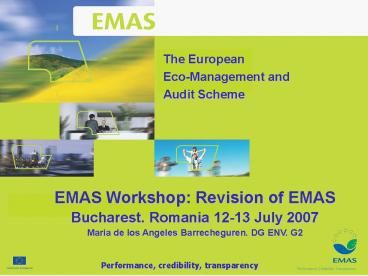The European EcoManagement and Audit Scheme - PowerPoint PPT Presentation
1 / 13
Title:
The European EcoManagement and Audit Scheme
Description:
Stakeholder workshop: 11-12 December 2006. Internet Stakeholders ... Discontinue all guidelines and only keep important part in Regulation. Objective ... – PowerPoint PPT presentation
Number of Views:40
Avg rating:3.0/5.0
Title: The European EcoManagement and Audit Scheme
1
The European Eco-Management and Audit Scheme
EMAS Workshop Revision of EMAS Bucharest.
Romania 12-13 July 2007 Maria de los Angeles
Barrecheguren. DG ENV. G2
- Performance, credibility, transparency
2
REVISION PROCESS
EP Council agreement
1st draft Revision
2005
2006
2007
2008
2009
2010
External evaluation
Commission adoption
New EMAS III
- Stakeholder workshop 11-12 December 2006
- Internet Stakeholders Consultation
December-February 2007 - COM Impact Assessment June 2007
- 1st Draft text July 2007
- COM Inter-Service Consultation September 2007
- Commission proposal October-November 2007
3
BACKGROUND
- EU Voluntary Scheme set-up 95 (revised 01)
- 5th 6th EAP alternative to command-and-control
legislation - Engage organisations in improving environmental
performances - Set the benchmark / system of reference
Current EMAS Requirements . ISO14001 EMS .
legal compliance . performance improvement .
public reporting . employee participation
Current EMAS situation . 5500 registrations .
Overall registrations at all high . 60 SMEs .
Main sectors chemicals food processing
4
EVER STUDY RESULTS
Drivers
. EMAS improves environmental performances .
EMAS improves compliance with environmental
legislation . No significant barrier to EMAS
implementation found
Barriers
. EMAS not seen as the system of reference .
Cost for SMEs . Lack of competitive reward
Other main findings
- . Majority do not want to stop EMAS useful
policy tool - . Most requested changes make EMAS global
provide incentives to participating organisations
5
REMAS PROJECT RESULTS
General Results
- . EMS leads to best site environmental management
- . Best site management
- better environmental performance
- better regulatory performance
EMAS ranks highest overall
Conclusion
- EMAS overall environmental impact
- Impact per organisation X Number of organisations
Not working, not enough market penetration
Working, EMAS is best existing EMS
6
PILLARS FOR REVISION (I)
- Reinforcement through strengthening rules on
- Legal compliance
- Performance improvement by introducing use of
KPIs - Raise attractiveness to participating
organisations - Allow registration outside EU, corporate
registration and cluster approach of
organisations for registration - Reducing administrative burden
- Improve EMAS promotion, technical assistance
- Add optional reporting options (product,
sustainability) - Increase incentives at Member States and EU level
- Review rules for use of logo and reporting
7
PILLARS FOR REVISION (II)
- Increase its user-friendliness
- Completely redraft existing Regulation
- Incorporate main elements of the existing
non-binding EMAS guidelines in the Regulation,
(legal certainty - clarity of requirements) - Align harmonisation, verification, registration
procedures
8
REINFORCEMENT OF THE SCHEME (I) (strengthen
legal compliance)
Objective
- Clearly position EMAS on its value added, over
other EMS - Increase clarity for organisations and regulators
Changes
- Clearly define in Regulation
- What is Legal compliance
- Role of organisation, verifier, competent body
- Mechanism to involve MS regulator
9
REINFORCEMENT OF HE SCHEME (II) (strengthen
performance improvement)
Objective
- Clearly position EMAS on its value added, over
other EMS - Better comparability more focus on political
priorities
Changes
- Clearly define performance improvement in
Regulation - Set requirements to organisations to
- Measure performance based on a set list of KPIs
- Obligatory generic KPIs in Regulation
- Voluntary sector-specific performance indicators
in guidelines (mechanism to be introduced into
new Regulation) - Report on reasons for missed targets
10
INCREASE EMAS ATTRACTIVENESS (I)
Make EMAS Global and allow corporate registration
cluster approach of organisations for
registration
Objective
- Address the single most frequent criticism of
EMAS - Enhance visibility of scheme abroad
- Allow use of EMAS as communication tool to
international customers - Allow for innovative, more-suited-to-business-need
s applications of EMAS without lowering
requirements - Reduce cost of EMAS implementation (SMEs)
Changes
- Create mechanism to allow 3rd country
organisation registration under EMAS - Create mechanism to allow corporate registration
and registration of clusters of organisations
under EMAS
11
INCREASE EMAS ATTRACTIVENESS (II)
Link EMAS with other EU legislation
Objective
- Better regulation
- Reduce administrative burden on EU organisations
Changes
- At EU level, link EMAS with
- ETS (verification as part of EMAS)
- IPPC (reduce permit renewal timing / cost,
inspections, etc) - Green Public Procurement
- Others (liability Directive waste, water
framework Directives, etc)
12
INCREASE EMAS ATTRACTIVENESS (III)
Improve promotion at MS EU level and MS
incentives
Objective
- Professionalise and better coordinate promotion
efforts - Better use of logo and report as communication
tools - Increase visibility of registered organisations
- Better regulation, reduce administrative burden
on EU organisations - Reward good organisations and enhance
attractiveness of scheme
Changes
- Increase promotion by MS by introducing stronger
obligation for MS in Regulation reporting
mechanism on MS promotion activities - Create pan-EU promotion strategy and actions
- Liberalise use of the EMAS Logo
- Set mandatory requirements to MS to provide
financial/ fiscal/ market-related incentives, to
reduce the administrative burden - Provide mechanism for MS to benchmark incentives
initiatives
13
INCREASE USER-FRIENDLINESS
Enhance Institutional Set-up and Re-cast
Regulation
Objective
- Increase clarity / reduce room for interpretation
for all parties involved reduced un-necessary
burden and cost for organisations - Strenghten credibility of scheme
- Re-write new Regulation in a more user-friendly,
logical way - Improve legal certainty reduce cost for
participating organisations
Changes
- Clarify align in Regulation role / tasks /
procedures of Accreditation Bodies,
Organisations, Verifiers, Competent Bodies,
Enforcement Authorities - Re-arrange structure of Regulation with separate
specific parts for each actor (AB, verifier, CB,
organisation) - Discontinue all guidelines and only keep
important part in Regulation































